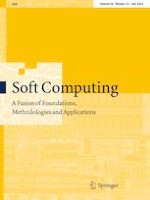02.06.2022 | Data analytics and machine learning
A quantum system control method based on enhanced reinforcement learning
Erschienen in: Soft Computing | Ausgabe 14/2022
EinloggenAktivieren Sie unsere intelligente Suche, um passende Fachinhalte oder Patente zu finden.
Wählen Sie Textabschnitte aus um mit Künstlicher Intelligenz passenden Patente zu finden. powered by
Markieren Sie Textabschnitte, um KI-gestützt weitere passende Inhalte zu finden. powered by
